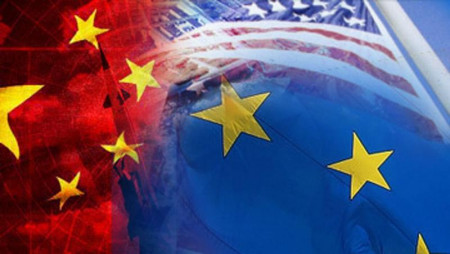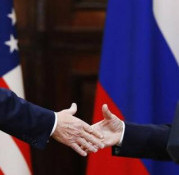
Recent months have produced a wave of analytical pieces examining how the erosion of U.S.-EU relations under Trump's tariff regime could reshape Europe's economic alignment with China. Some suggest the latter may ultimately find a new ally in its trade confrontation with America. Indeed, signs of EU-China rapprochement are emerging. Following Donald Trump's announcement of "retaliatory tariffs," EC President Ursula von der Leyen held a phone call with Chinese Prime Minister Li Qiang, emphasizing the shared responsibility of Europe and China — as the world's two largest markets — to uphold a rules-based global trading system. Li Qiang responded that China is "ready to work with Europe to promote the sound and steady development of the bilateral relationship." Several EU leaders have similarly called for closer cooperation, marking a stark contrast to their previous rhetoric about "de-risking" supply chains from China.
Shortly after the introduction of tariffs, China was visited by several European officials: Ignazio La Russa, President of the Italian Senate; the Foreign Ministers of Portugal and France; the Speaker of the Finnish Parliament; European Commissioner for Trade and Economic Security Maroš Šefčovič; and Spanish Prime Minister Pedro Sánchez. The visits resulted in agreements to resume dialogue on resolving trade disputes and facilitating mutual market access, particularly regarding the revision of EU’s protective measures on Chinese electric vehicles and China’s retaliatory measures on European alcoholic and food products. The parties agreed to explore opportunities for joint investment in the car industries of China and the EU. The European Parliament reached the "final stage" of negotiations with China on lifting sanctions against EU lawmakers, which China had imposed in response to EU sanctions in 2021. During Spanish Prime Minister Pedro Sánchez’s visit to China in April, the sides concluded a series of cooperation agreements in trade, economic, educational, and scientific-technological spheres, adopting an action plan to step up their comprehensive strategic partnership.
For its part, China has agreed to limit exports to the EU, increase investment, and withdraw trade complaints against imports of EU brandy, pork, and dairy products, which were filed in 2024. In recent weeks, several trade delegations have visited European capitals, while industrial players are exploring chances to redirect goods to the EU. Thus, Beijing also seeks to take advantage of the opportunity to support Brussels in its disputes with the Trump administration and prevent a unified Western front from being formed against China — a trend that had been developing under Biden — while finding alternative markets for its goods.
However, to properly assess the chances of a fundamental shift in EU-China relations, one has to understand how far each side is willing to go. Chinese authorities seek to strengthen economic cooperation with the EU to offset losses from the trade conflict with the US. According to Chinese experts, it is time for China and Europe to start anew and rethink their trade relations. There is significant potential for cooperation in a number of sectors and regions, such as Central Asia (CA). Chinese analysts believe that the PRC and the EU share similar interests in the region, creating a foundation for regional collaboration. Particular attention is being paid to the development of transport corridors, which are seen as a means to strengthen reliable East-West logistics, as well as cooperation in energy and the utilization of natural resources.
There is also significant potential for China to strengthen relations with a number of European countries. For instance, with Hungary, where the PRC opened an e-vehicle center in 2024 amid tensions between Brussels and Beijing. Another candidate for deeper cooperation is Spain. Following his visit to China in April, Spanish Prime Minister Pedro Sánchez called for a reassessment of the EU’s stance toward Beijing and formation of more balanced alliances in light of US trade policies. As Bloomberg noted, given the signing of agreements in sectors such as pharmaceuticals, agriculture, and medical goods, Spain is emerging as a promising Chinese partner in Europe amid growing uncertainty.
Europe’s incentive stems from a growing recognition that Washington is no longer a reliable ally and that its trajectory must shift toward "strategic autonomy." However, leaders of major European countries and the European Commission deem Trump as a temporary figure and have currently embraced a "wait it out" approach. Under this tactic, Europe will likely drift closer to Beijing during the initial phase of Trump’s presidency. At the same time, European leaders anticipate a US return to its previous political course after Trump’s departure and are unwilling to seriously jeopardize relations with Washington — especially since US officials have warned them of the aftermath. As US Treasury Secretary Scott Bessent stated, "Europe would be cutting its own throat" if it seeks a closer alliance with China.
Thus, the Trump-initiated tariff war could bring the two sides closer together to better withstand pressure from Washington. However, while many analysts are now talking about a "reset" in EU-China relations, the idea of a radical "reboot" remains unlikely over a number of economic and political factors.
Thus, EU leadership remains skeptical about becoming a "dumping ground for Chinese goods redirected from the US". Another thing hindering relations with China is its close ties with Russia boosted after Xi Jinping's visit to the Victory Day military parade on May 9.
Moreover, US tariffs create different opportunities for the EU and China. In Europe, as ECB President Christine Lagarde stated, they create conditions for reducing inflation. "China will have overcapacity and will want to reroute its exports somewhere, possibly to Europe, and that would have a dampening impact on prices," she believes.
In conclusion, it can be stated that the potential for economic rapprochement between the EU and China remains fundamentally limited, as both are export-oriented economies and direct competitors, particularly in the automotive sector and clean technologies. However, at the geopolitical level, they will likely seek closer cooperation at the end of the day.


